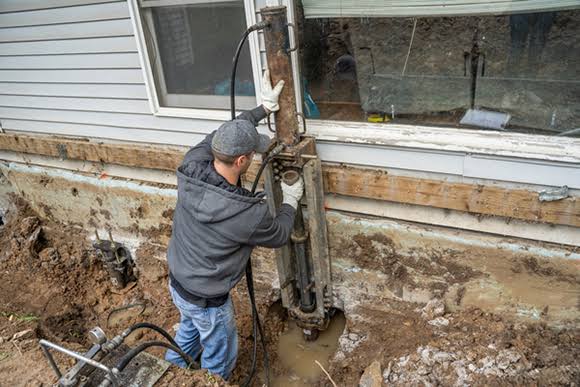Foundation problems can cause severe damage to a home if left unaddressed. In Atlanta, GA, the clay-heavy soil, frequent rainfall, and temperature fluctuations contribute to a higher risk of foundation issues. Homeowners looking to repair their foundations must consider various aspects of the process, including costs, permits, timelines, and the necessary steps to ensure long-term stability. This article offers a detailed guide to foundation repair in Atlanta GA, focusing on soil reports, city permits, and the project’s phases.
The Need For Foundation Repair
Before delving into the specifics of costs, permits, and timelines, it’s important to understand why foundation repair is essential. The foundation of a house supports its structure, and any changes might cause wall fractures, uneven floors, and unclosed doors and windows. Common foundation issues in Atlanta include settling, heaving, and shifting caused by soil movement.
The soil in the Atlanta area, particularly the clay-rich variety, expands when wet and contracts during dry periods. This cyclical movement puts significant stress on foundations, making them more prone to issues. Therefore, foundation repair is not just a cosmetic fix but a crucial investment to maintain the structural integrity of a home.
Soil Reports: Assessing The Problem
Before starting any foundation repair project, a detailed soil report is crucial. The soil report helps professionals understand the type of soil under the home and its behavior over time. Atlanta’s clay soil swells and contracts when wet and dry, displacing foundations.
A soil engineer will typically perform soil testing, which involves collecting samples from around the property and analyzing their moisture content, compaction, and load-bearing capacity. This report provides the foundation repair contractor with essential information on the soil’s movement patterns and the necessary techniques to address the foundation issues effectively.
Permits And Regulations: Navigating Atlanta’s Building Codes
In Atlanta, foundation repair projects often require permits from the city. Permits are necessary to ensure that the repair work complies with local building codes, guaranteeing that it is safe and up to standard. These permits also help in managing the city’s development and ensuring that the project doesn’t interfere with public infrastructure or environmental safety.
To obtain a permit for foundation repair in Atlanta, homeowners typically need to submit an application to the City of Atlanta’s Department of City Planning. The application will require detailed plans for the repair, including the methods used and materials to be employed. If the project involves substantial excavation or changes to the land, additional permits may be required.
Hire a contractor who knows the city’s permitting process. They can present the required papers and complete the work legally. Failure to obtain permission can result in fines or issues when selling the home.
Phases Of Foundation Repair In Atlanta, GA
Foundation repair projects generally unfold in several phases. These phases are critical to ensuring the stability of the foundation and protecting the home from further damage.
1. Initial Assessment And Inspection: The process begins with an inspection of the foundation by a professional. The inspector will assess any visible cracks, settling, or other signs of damage. To better understand house soil characteristics, they may request a soil report. The contractor will determine if the problem is localized or foundation-wide at this step.
2. Planning And Permits: Once the inspection is complete, the contractor will formulate a repair plan. This plan will detail the methods and materials used, and it will include the estimated cost and timeline for the project. At this point, the necessary city permits will be applied for and obtained. It’s crucial that the contractor follows all local regulations to ensure the repair meets safety standards.
3. Foundation Repair Work: With the plan in place and permits approved, the actual repair work begins. This phase may involve lifting the foundation, stabilizing it with piers or steel supports, or filling voids under the foundation to prevent further shifting. In some cases, the contractor may install a drainage system to manage water flow around the foundation and prevent future water damage.
4. Post-Repair Inspection And Final Approval: After the repair work is completed, a final inspection will be conducted. The city may require this inspection to confirm that the repair was performed according to the approved plans and complies with safety codes. The project will be finished after the work is validated and permissions closed.
Costs And Timelines
The extent of the damage, soil type, repair method, and permit status can affect Atlanta foundation repair costs. On average, foundation repair in Atlanta can cost between $2,000 to $12,000, with more extensive repairs running higher. The most common method, piering, typically costs between $3,000 and $7,000.
Timelines for foundation repair also vary, depending on the complexity of the issue. Minor repairs may take only a few days, while more significant repairs can take up to two weeks or longer. Working with an experienced contractor who can tailor a timeframe to your project is crucial.
Conclusion
Foundation repair in Atlanta, GA, involves planning, skill, and attention to detail. Homeowners must understand the importance of a soil report, navigate the city’s permit requirements, and follow the necessary phases of the repair process to ensure lasting results. Although the costs may vary depending on the scope of the project, timely repairs can save homeowners from more severe structural issues in the future. By hiring qualified professionals and staying informed about the process, you can secure the foundation of your home for years to come.
